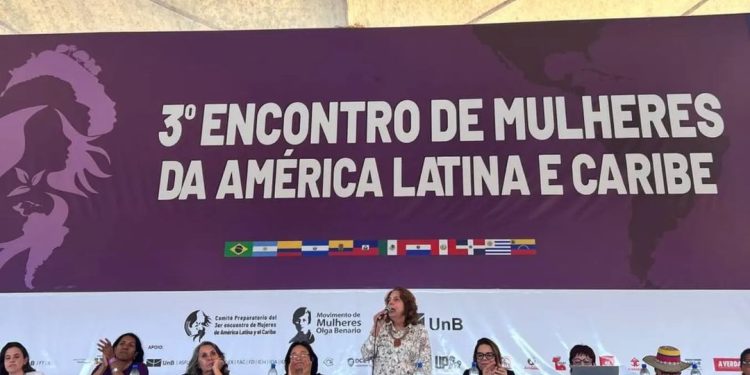BRASILIA – The opening of the 3rd Meeting of Women from Latin America and the Caribbean, this Friday (21), was marked by a large march that brought together more than 500 women at the Esplanada dos Ministérios, in Brasília (Brazil).
The demonstration, which carried the theme “For the rights and emancipation of women! For a sovereign Latin America and the Caribbean! No to imperialist intervention!”, chanted slogans throughout the course. There are several women from 12 countries participating in the event, at the University of Brasília (UnB), on the 21st, 22nd and 23rd of July.
The strength of the demonstration was represented by various women’s movements, feminist movements, trade unions, student organizations, urban and rural workers, women, women with disabilities, indigenous, black and quilombola women from all over the continent.

According to Luz Eneida Mejía, from the Movement of Working Women of the Dominican Republic, “women are a fundamental force for social transformation, there is no democracy, nor justice, nor sovereignty without the organized participation of women”. Then, Yanel Mogaburo, of the Revolutionary Communist Party of Argentina, said: “We women were the ones who suffered the most in the pandemic, we are here today for our daughters and for all women. The struggle of all peoples for their liberation is also our struggle”.
Carlin Camacaro, from the Ana Soto Women’s Movement in Venezuela, expressed the importance of Latin American solidarity with her people and with Venezuelan women, who live under constant attacks from US imperialism. Another important complaint came from Milagros Lerzundi, from the Movement of Women for Social Liberation of Peru, reporting that his country is going through a moment of gigantic demonstrations in defense of democracy and the rights of the working class.
During the walk, the companions Dora Flecha, from Paraguay; Julia Paredes, from Ecuador; Tânia, from Uruguay; Clara, from El Salvador and Cristina Cabib, Madres de la Plaza de Mayo (Argentina). In addition, Ismari Ramirez Bautista, of the Popular Revolutionary Front of Mexico, stated that women in his country are dying more and more. The increase in feminicide is one of its main flags in the fight for women’s lives.
Closing the speeches of the foreign delegations, Ana Cristina, from Colombia, stated that the meeting is a space to strengthen the revolutionary struggle. “We, Colombian women, suffer from an increase in state violence, which murders thousands of political leaders in our country, as a result of increased militarization and the presence of imperialism”.
Gabriela Gonçalves, from the National Coordination of the Olga Benario Women’s Movement, says that the construction of the 3rd Meeting in Brazil will strengthen the struggles of women from all the countries present. “We don’t just want to survive. We want to live and have the right to food, land, housing, employment, a life with rights and dignity. Our suffering is the result of the capitalist system, which murders, exploits and oppresses millions of women and workers. That’s why we organize to fight for our lives and for socialism,” she says.

Leonardo Péricles, president of the Popular Unit (UP), also denounced that fascism in Brazil was defeated in the last elections, but it is still necessary for us to remain in the fights and in the streets to destroy the extreme right. “Bolsonaro being ineligible was a small victory, but we need to fight for him and his accomplices to be punished, as well as the coup plotters and torturers in our country. Women were the front line against fascism in Brazil. They are also the most affected by the Labor and Social Security Reforms.
The march also had the participation of Camila Félix (SinaseFe-National); Rosângela Costa (Fasubra); Roccléia Silva, (Quilombo Nossa Senhora do Bom Remédio, from Pará); Alda Lúcia (president of Fenametro); Carla Marcia Viana (Sintfub); Poliana Souza (Struggle Movement in Neighborhoods, Villages and Favelas).
At the end, a manifesto signed by all the countries present was delivered by Indira Xavier, from the International Preparatory Committee, to the representatives of the Ministry of Social Equality – Rachel Barros; Ministry of Indigenous Peoples – Jozileia Kaigang; and Women’s Ministry – Isis Táboas. All of them publicly committed themselves to debating the document and providing guidelines for the guidelines.




